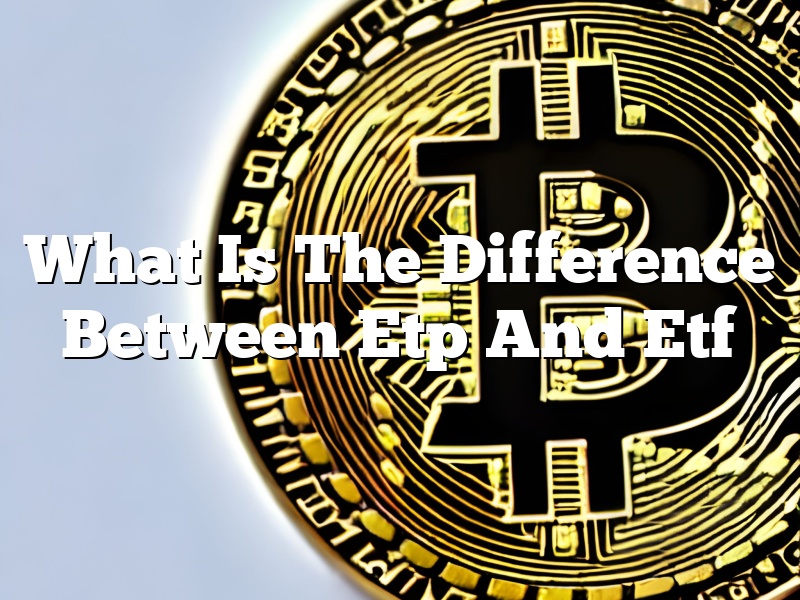What Is The Difference Between Etp And Etf
What is the difference between an ETF and an ETP?
An ETF, or exchange-traded fund, is a type of investment fund that trades on a stock exchange. ETFs hold a collection of assets, like stocks, bonds, or commodities, and track an index, a basket of assets, or a particular strategy.
ETPs, or exchange-traded products, are a type of security that tracks an index, a basket of assets, or a particular strategy. ETPs can be ETFs or other types of security, like stocks, bonds, or commodities.
The main difference between ETFs and ETPs is that ETFs are registered with the SEC, while ETPs are not. This means that ETFs are subject to more regulations, like disclosing their holdings regularly and proving that they are not engaged in fraud.
ETPs are not as regulated as ETFs, and they can be created by anyone, including hedge funds and banks. This means that they can be riskier investments and may not have the same transparency as ETFs.
Both ETFs and ETPs can be bought and sold during the day like stocks, and they can be held in tax-advantaged accounts like IRAs.
So, what’s the difference between ETFs and ETPs?
ETFs are registered with the SEC and subject to more regulations, while ETPs are not registered with the SEC and may be riskier investments. ETFs can also be bought and sold during the day like stocks, while ETPs cannot.
Contents
What does ETP mean in investing?
In investing, ETP stands for exchange-traded product. This is a type of security that is traded on a securities exchange and can be bought and sold just like stocks. ETPs include exchange-traded funds (ETFs), exchange-traded notes (ETNs), and exchange-traded commodities (ETCs).
ETPs can be used to achieve a variety of investment objectives, including income, capital preservation, and capital growth. They can also be used to track a particular index or sector, or to gain exposure to a certain asset class.
ETPs are typically less volatile and have lower fees than individual stocks. This makes them a popular choice for investors who are looking for a diversified, low-cost investment.
What does ETP type mean?
ETP type is a term that is used in the telecommunications industry. It stands for Ethernet transport packet. This type of packet is used to transmit data over a network. It is a reliable and efficient way to move information between devices.
What is the difference between an ETF and an ETC?
An Exchange Traded Commodity (ETC) is a security that represents a commodity in the physical world. An ETF, or Exchange Traded Fund, is a security that represents a basket of securities, commodities, or derivatives.
ETCs track the price of the underlying commodity, while ETFs track the performance of an underlying index. For example, an ETF that tracks the S&P 500 will move in tandem with the S&P 500. An ETC that tracks gold will move in tandem with the price of gold.
ETCs are more speculative than ETFs. They are more volatile and typically have a higher yield. ETFs are more conservative and typically have lower yields.
ETCs are simpler to trade than ETFs. They can be traded on a commodities exchange, while ETFs can only be traded on an exchange that specializes in ETFs.
ETCs are more tax-efficient than ETFs. Because they are not subject to capital gains taxes, they are a better option for investors who hold them for the long term. ETFs are more tax-efficient than mutual funds, but they are not as tax-efficient as ETCs.
ETCs are less regulated than ETFs. They are not subject to the same rules and regulations as ETFs, which means that they are more susceptible to fraud and manipulation. ETFs are more regulated than ETCs.
What does ETP mean ASX?
ETP is an acronym for Exchange Traded Product. It is a type of security that is traded on a securities exchange. ETPs can be created from a variety of underlying assets, such as stocks, bonds, commodities, and currencies. They can be structured as open-end funds, exchange-traded funds (ETFs), or unit trusts.
Is ETP a good investment?
ETP is a good investment because it offers a way to invest in a basket of assets. This can provide stability and diversity for an investor’s portfolio. ETPs can also be traded on exchanges, which makes them liquid and easy to buy and sell.
Are ETP safe?
Are ETP safe?
This is a question that is often asked by investors, as ETPs are a relatively new investment product.
ETPs are exchange-traded products, which means that they are traded on a stock exchange like regular stocks. There are a variety of different types of ETPs, including ETFs, ETNs, and closed-end funds.
ETPs are generally considered to be safe investments. They are backed by a variety of assets, including stocks, bonds, and commodities. This means that they are not as risky as individual stocks or bonds.
ETPs can be a great way to diversify your portfolio. They offer exposure to a wide range of assets, and they can be traded like regular stocks.
However, it is important to do your research before investing in ETPs. Not all ETPs are created equal, and some may be riskier than others. So, be sure to understand the risks and rewards associated with each ETP before investing.
Overall, ETPs are a safe and efficient way to invest in a variety of assets. They offer a high level of diversification, and they can be traded like regular stocks. So, if you are looking for a safe and reliable investment, ETPs may be a good option for you.
Is ETP tax free?
In Malaysia, ETFs are classified as units trust and are therefore subject to the same tax treatment as other unit trust. The income generated by an ETF is subject to tax at the rate of 10%, which is the same as for other investment products in Malaysia.






0